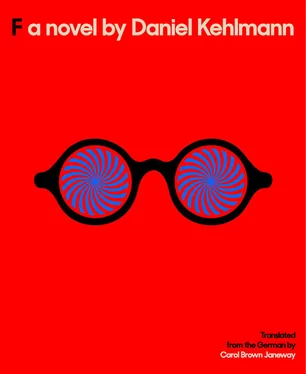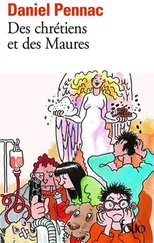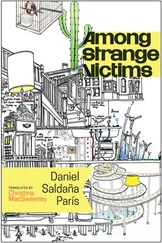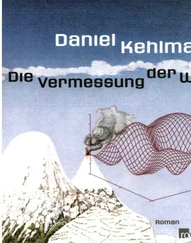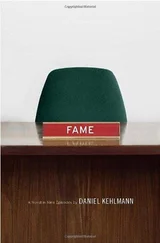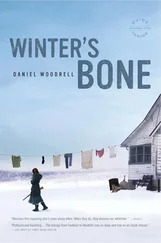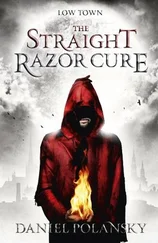“You should lie down,” says Laura.
“Yes,” says my mother-in-law. “You’re pale. Better go to bed.”
I wait, but no one says anything more. They all smile. I leave the room unsteadily.
Right foot down the first step. I avoid looking in the direction of the cellar door, because I know that if the bolt isn’t fully closed or the door is actually open, my heart will stop. I go through the hall and open the front door.
It’s dark, but the air is still very hot. To my right, pressed against the wall, crouches a shaggy-coated creature that stares at me. Its smell is acrid and biting. As I stop, it bounds away on cloven feet and disappears into the blackness of the hedge.
I haul up the garage door. Knut is already off duty, I have to drive myself. Perhaps I shouldn’t be doing this, given the state I’m in, but I’ll manage it somehow. The engine rumbles into life and the car rolls onto the street. I see my house in the rearview mirror. A pale glow of light is emanating from the attic. Who could be up there?
But I’ve already rounded the corner.
Please no accident now, not after all the pills. This time I’m not calling Sibylle, I want to surprise her.
And if she isn’t alone?
The thought cuts through my daze. The car swerves into the middle of the street, horns blare, but I get it under control again. If there’s a man with her, I’ll have to kill him! I turn the steering wheel and a yellow plastic garbage container gets in my way. I dodge, but it hits the right side of the car so hard that the lid flies off and cardboard boxes go sailing all over the street. I brake, and the car stops. Pedestrians are staring at me. A car stops on the other side of the street; two men get out and come toward me.
I’m ready to step on the gas and run them over, but that’s what they intend: I’m supposed to lose control of myself. I get out, fists clenched.
“Do you need help?” one of them asks.
“Are you hurt?” asks the other.
I start to run. I run through a narrow alley, jump over the fence surrounding a building site, clamber over an excavator shovel and another fence, and keep running until I lose my breath and look around with a pounding heart. No one seems to be following me. But how can I be sure? They’re so cunning.
A pedestrian zone. I detour around two women, a policeman, and two youths, Adolf Kluessen, and two more women. Kluessen? Yes, I saw him quite clearly, either it was Kluessen himself or they sent someone who looks just like him. For a moment Maria Gudschmid’s face surfaces under a streetlight, but this at least means nothing, because all sorts of women look just like her. I leave the pedestrian zone, cross a street, walk up a narrow ramp, and reach the front door of Sibylle’s building. It’s locked. I press the buzzer.
“Yes?” It’s her voice in the loudspeaker, and it comes so quickly that she must have been waiting at the door — but not for me, she didn’t know I’m coming, so who’s she waiting for?
“It’s me,” I say into the microphone.
“Who?”
If she doesn’t let me in now, if she doesn’t open the door at once, if she makes me stand out here on the street, it’s over.
“Eric?”
I don’t reply. The door opens with a hum.
Someone touches my arm. Behind me there’s a thin man with a long nose and a narrow chin. In one hand he’s holding the handlebars of a bicycle, and in the other he has a well-worn plastic shopping bag.
“You shouldn’t have gotten involved,” he says. “You should have left the three of them alone. It was none of your business.”
I slam the door behind me and run up the stairs. If she has a man with her, if there’s a man, if she, if … her floor. She’s standing in the doorway.
“So what’s wrong?” she asks.
“The thing with the car should never have happened. Just left standing like that. What will people think!”
“What are you talking about?”
“I must report it stolen.”
I walk past her into the apartment. There’s no one here. She’s alone. I sink down onto the nearest chair and switch on my cell phone. Nine calls, three from my office, six from home, three text messages. I switch it off again.
“What’s happened, Eric?”
I want to answer that absolutely nothing has happened, that everything has simply become too much for me. I want to answer that I’m just stuck. But all I say is “It’s been a hard day.” And as I’m looking at her, I realize I don’t even want to be here with her. I want to go home.
“I wanted to be with you,” I say.
She comes closer, I stand up and manage to do everything necessary. My hands go where they’re supposed to, my movements are the right ones, and I even succeed in enjoying the fact that this is what she wants so much, and that she’s soft and smells good and maybe even loves me a little.
“Me too,” she whispers, and I ask myself what I’ve gone and said again now.
Afterward I lie there awake, listening to her breathing and looking up at the dark expanse of ceiling. I mustn’t go to sleep, I have to be home before dawn comes and Laura wants to tell me her dream.
I get up silently and put on my clothes. Sibylle doesn’t wake up. I slide out of the room on tiptoe.
“Have you seen Carrière’s new exhibition?”
“Yes, and I’m a bit stumped.”
“Oh?”
“People say he challenges our usual ways of seeing. He says it too. In every art magazine right now. But basically what it boils down to is him admitting that pictures are only pictures, not reality. He’s as proud of this as a child who’s just discovered there is no Easter Bunny.”
“That’s mean.”
“But I really admire him.”
“Quite right, too.”
We both smile. The situation is complicated. In my profession it’s not just a matter of selling paintings — you also have to sell them to the right people. Naturally I have to convince Eliza that her collection needs another Eulenboeck, but at the same time Eliza has to convince me that her collection is the right home for Eulenboeck. There won’t be many more Eulenboecks coming onto the market, and meanwhile the museums have become interested in him, and granted, they pay less, but they can raise the reputation of an artist enormously, which in turn causes auction prices in the secondary market to soar. You have to be careful: if prices rise too precipitously, they soon collapse again, and the result is all the art magazines pronouncing that the market has delivered its verdict, and the name of the artist never recovers. So Eliza has to convince me that she won’t dispose of the painting I’m going to sell her as soon as she can turn a profit on it; she has to convince me that she’s a serious collector, just as I have to convince her that Eulenboeck’s value will not decline in the long run.
But we don’t talk about any of this. We each sit in front of a plate of salad, sip our mineral water, smile a lot, and talk about anything and everything except what it’s actually all about. I’m a good artist’s executor, she’s a good collector, and we both know the game.
So we talk about the terraces in Venice. Eliza has an apartment in Venice with a view of the Grand Canal. I went to visit once and it never stopped raining; mist crawled over the water and the city seemed lethargic, dark, and stagnant. We laugh about the parties at the Biennale, we both think that they’re exhausting and loud and a big effort, but you still have to go, you have no choice. We agree that great beauty makes too many demands: you are helpless in front of it, it’s as if you have to react in some way, do something, respond to it, but it remains mute, and rejects you with sovereign equanimity. This of course leads to Rilke. We talk about his time with Rodin, we talk briefly about Rodin himself, then, it’s unavoidable, we talk about Nietzsche. We order coffee, neither of us has touched our salad, who has an appetite on a day as hot as this? And now, because time is running out, we get around to talking briefly about Eulenboeck.
Читать дальше
